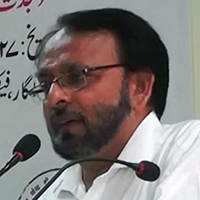- Index of Books 188948
-
-
Book Categories
-
Activities77
Children's Literature2089
Drama1034 Education393 Essays & Profiles1557 Fiction1792 Health109 History3626Humorous754 Journalism220 Language & Literature1974 Letters824
Life Style29 Medicine1053 Movements298 Novel5056 Political377 Religions5058Research & Criticism7443Short-story3031 Sketches290 Social issues121 Sufism / Mystic2302Text Books566 Translation4621Women's writings6303-
Book Categories
- Bait Bazi14
- Catalogue / Index5
- Couplets70
- Deewan1491
- Doha53
- Epics106
- Exegesis214
- Geet68
- Ghazal1413
- Haiku12
- Hamd55
- Humorous37
- Intikhab1682
- Keh mukarni7
- Kulliyat694
- Mahiya21
- Majmua5427
- Marsiya406
- Masnavi898
- Musaddas62
- Naat614
- Nazm1324
- Others83
- Paheli16
- Qasida203
- Qawwali18
- Qit'a74
- Quatrain307
- Quintuple16
- Rekhti13
- Remainders27
- Salaam36
- Sehra12
- shahr-Ashob, Hajw, Zatal Nama20
- Tareekh-Goi31
- Translation73
- Wasokht29
Profile of Aaftab Ahmad Afaqi
Professor Aftab Ahmad Afaqui (b. January 10, 1965) hails from Kobra Khurd, now in Jharkhand. He grew up in a scholarly atmosphere on both his maternal and paternal sides. He received his early education up to class seven at the Urdu Middle School in his native village. His intellectual and moral upbringing was deeply influenced by his maternal grandfather, his mother, and his revered teacher Maulvi Sharafuddin Sahib, a distinguished scholar of Urdu, Persian, Arabic, and English. It was under his guidance that Afaqui imbibed a love for Urdu as his mother tongue and was introduced to its rich literary, cultural, and religious heritage.
Urdu was the household language; he read Dastan-e-Amir Hamza during childhood and also enjoyed the works of Rashid-ul-Khairi. As a young reader, he regularly read children’s magazines such as Ghuncha and Madina. He completed his secondary education from Rahmania High School, Tara Palamu, and went on to earn his B.A., M.A., and Ph.D. from Ranchi University, studying under eminent teachers including Prof. Wahab Ashrafi, Prof. S. Akhtar, Prof. Abu Zar Usmani, Prof. Ahmad Sajad, Prof. Samiul Haq, and Prof. Sadiq Mujibi.
After qualifying in the Staff Selection Commission (SSC) examination in Delhi, he was appointed as an Urdu Teacher in the Municipal Corporation Schools in 1993, where he served for about twelve years. During this period, he actively participated in literary seminars and conferences, and came into contact with major literary figures including Prof. Qamar Rais, Dr. Khalique Anjum, Prof. Tanveer Ahmad Alvi, Prof. Abdul Haq, Prof. Ateeq Ullah, and the great scholars Rasheed Hasan Khan and Tanveer Ahmad Alvi, from whom he learned extensively. He also served as a Research Associate at Delhi University.
In 2003, he joined the Department of Urdu, Banaras Hindu University (BHU) as a Lecturer, was promoted to Professor in 2018, and continues to serve as Head of the Department. Under his editorship, the biannual research journal “Dastak” has been published regularly, with more than fifteen special issues to date. It is now recognized nationally and internationally as a reputed refereed journal. Through numerous seminars, webinars, and workshops, he has significantly enhanced the academic visibility of the Urdu Department at BHU.
Professor Afaqui is widely regarded as a serious and dedicated scholar of Urdu. His research and critical writings are regularly published in reputed Urdu journals. His notable works include:“Moulud Sharif-e-Hali: Taruf wa Tuhshiya” (2001), “Klassiki Nasr ke Asaleeb” (2003 & 2010), “Mohammad Ali Johar: Shakhs aur Shair” (2004), “Ma’ni Shanasi” (2007), “Shikast ki Awaaz: Nayee Atraf ki Taraf” (2015), “Qazi Abdul Wadood: Monograph” (2016), “Mazaameen-e-Chakbast: Tarteeb o Taleef” (2016), “Urdu-Hindi Muhavare” (2018), “Salaam Machhli Shehri: Monograph” (Sahitya Akademi, 2022), “Imdad Imam Asar: Monograph” (Urdu Directorate, Patna, 2023), and “Fankar se Fan Tak” (Educational Publishing House, Delhi, 2024).
His forthcoming works include “Urdu Nasr mein Hali ke Karname,” “Tareekh-e-Tahqiq o Tadwin,” “Urdu-Hindi ki Saajhi Virasat (Hindi),” and “Tazkira-e-Sha’iraat-e-Urdu.”He is a member of the Board of Studies in over a dozen universities and institutions and has been honoured by various literary bodies including the Uttar Pradesh Urdu Academy, Bihar Urdu Academy, and Delhi Urdu Academy for his outstanding contribution to Urdu scholarship.
Tagged Under
join rekhta family!
-
Activities77
Children's Literature2089
-


